AMD Zen 4 Ryzen 9 7950X and Ryzen 5 7600X Review: Retaking The High-End
by Ryan Smith & Gavin Bonshor on September 26, 2022 9:00 AM ESTCPU Benchmark Performance: Power, Web, And Science
Our previous set of ‘office’ benchmarks has often been a mix of science and synthetics, so this time we wanted to keep our office section purely on real-world performance. We've also incorporated our power and science testing into this section too.
In this version of our test suite, all the science-focused tests that aren’t ‘simulation’ work are now in our science section. Where possible these benchmarks have been optimized with the latest in vector instructions.
We are using DDR5 memory on the Ryzen 9 7950X and Ryzen 5 7600X, as well as Intel's 12th Gen (Alder Lake) processors at the following settings:
- DDR5-5200 CL44 - Ryzen 7000
- DDR5-4800 (B) CL40 - Intel 12th Gen
All other CPUs such as Ryzen 5000 and 3000 were tested at the relevant JEDEC settings as per the processor's individual memory support with DDR4.
Power
The nature of reporting processor power consumption has become, in part, a dystopian nightmare. Historically the peak power consumption of a processor, as purchased, is given by its Thermal Design Power (TDP, or PL1). For many markets, such as embedded processors, that value of TDP still signifies the peak power consumption. For the processors we test at AnandTech, either desktop, notebook, or enterprise, this is not always the case.
Modern high-performance processors implement a feature called Turbo. This allows, usually for a limited time, a processor to go beyond its rated frequency. Exactly how far the processor goes depends on a few factors, such as the Turbo Power Limit (PL2), whether the peak frequency is hard coded, the thermals, and the power delivery. Turbo can sometimes be very aggressive, allowing power values 2.5x above the rated TDP.
AMD and Intel have different definitions for TDP but are broadly speaking, applied the same. The difference comes from turbo modes, turbo limits, turbo budgets, and how the processors manage that power balance. These topics are 10000-12000 word articles in their own right, and we’ve got a few articles worth reading on the topic.
- Why Intel Processors Draw More Power Than Expected: TDP and Turbo Explained
- Talking TDP, Turbo and Overclocking: An Interview with Intel Fellow Guy Therien
- Reaching for Turbo: Aligning Perception with AMD’s Frequency Metrics
- Intel’s TDP Shenanigans Hurts Everyone
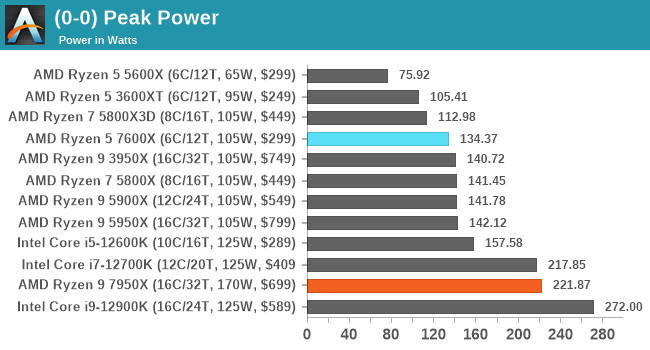
Looking at the results of our Peak Power test, the Ryzen 9 7950X topped out at 221.8 W, which is around 30% higher than the TDP of 170 W it comes with. As stated by AMD, the Power Package Tracking or PPT limit for AM5 motherboards when used with 170W TDP Ryzen 7000 SKUs will be 230 W. Still, while it draws more power than its generational predecessors such as Zen 3 and Zen 2, the Zen 4-based Ryzen 7000 series benefits from higher core clock speeds, a higher single core boost frequency, as well as other implementations around TSMC's 5 nm manufacturing process.
The AMD Ryzen 5 7600X is more aimed at the mid-range, and as such has a lower overall power draw, with the peak power figures in our testing reaching 134.3 W. This is around the same levels of power draw as the Ryzen 9 3950 X, the Ryzen 9 5900X, and the Ryzen 7 5800X. Per AMD's specifications, the Ryzen 5 7600X has a TDP of 105 W, with around a 27 % variance in peak power compared to TDP.
From our testing, so far, it seems that Ryzen 7000 when combined with a premium X670E motherboard allows for up to 30% in terms of extra power allowances for higher single-core boost and overall faster all-core frequencies.
Web
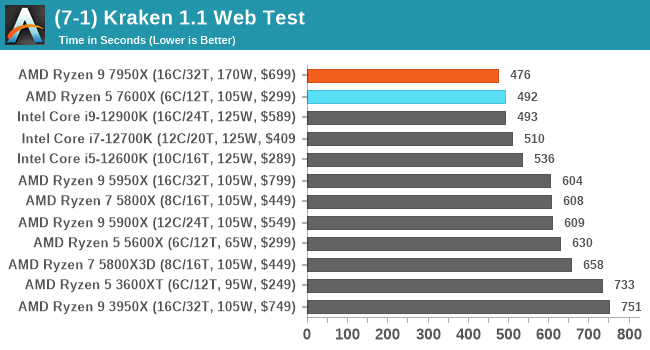
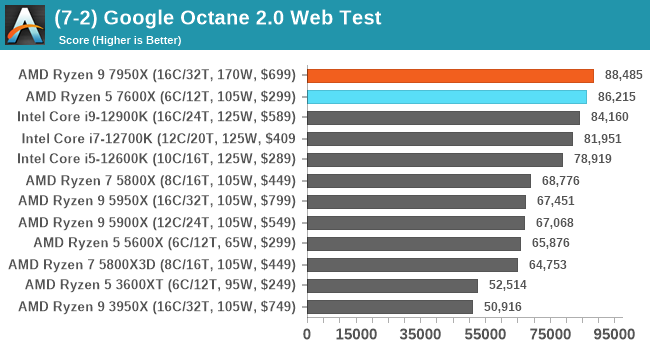
In our web tests, the overall improvements in IPC, frequency, clock speeds, and the switch to DDR5 all play a part in performance here. Both the Ryzen 9 7950X and Ryzen 7 7600X top our charts in regards to web testing, although performance isn't as apparent as it should be in other areas.
Science
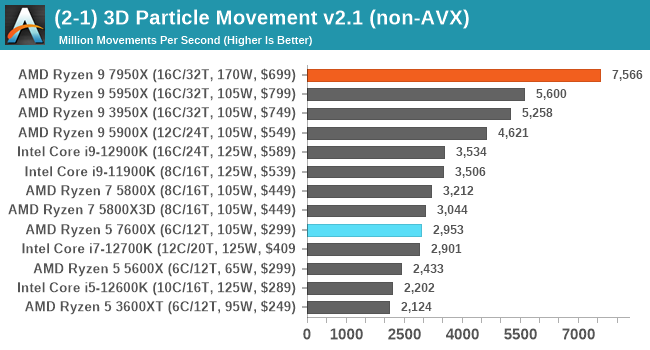
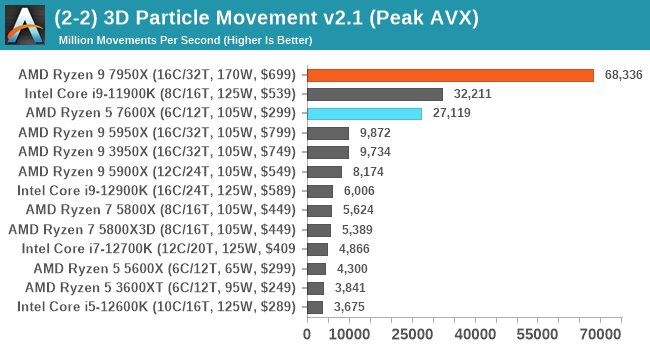
For our 3DPM v2.1 testing, we added in the Intel Core i9-11900K (Rocket Lake) to show performance across AVX workloads. Although Intel officially fused off the AVX2/512 extensions on Alder Lake which did cause a little controversy and gave the impression that AVX-512 on consumer platforms was dead. AMD clearly believes the opposite, as it has implemented it so that AVX-512 runs two cycles over a 256-bit wide instruction. The performance of the Ryzen 9 7950X here is phenomenal, although the Core i9-11900K which did indeed feature AVX instruction sets in the silicon, is still better than the Ryzen 5 7600X with AVX workloads.
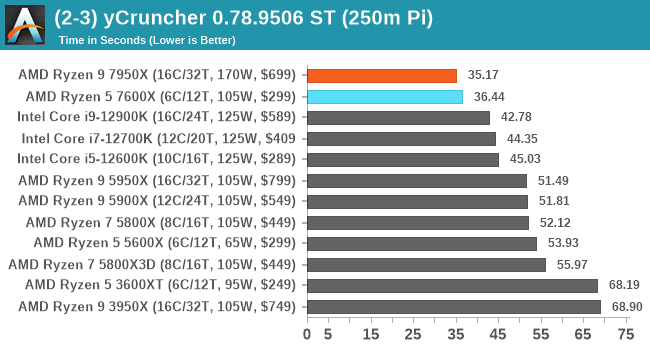
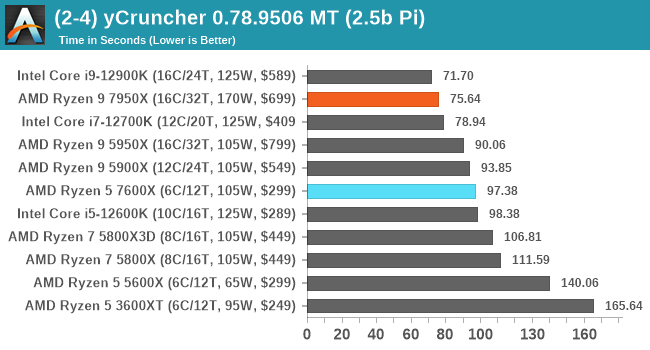
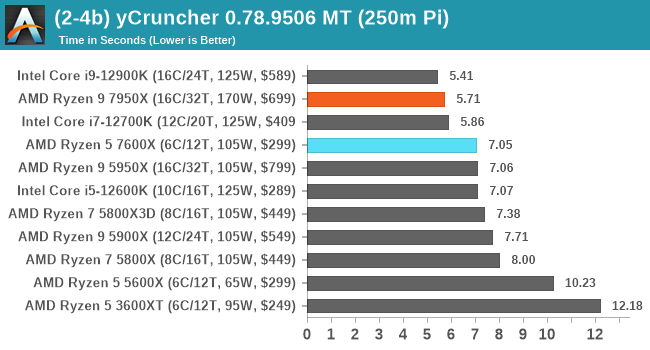
Focusing on our more science-based tests, both the Ryzen 9 7950X and Ryzen 5 7600X perform well against the competition. In our 3DPMv2.1 test in non-AVX, the Ryzen 9 7950X provided a jump of 35% in performance against the previous generation Ryzen 9 5950X processor.
Interestingly, in our yCruncher 0.78 test, the Ryzen 9 7950X and the Core i9-12900K trade blows consistently, although the Ryzen 5 7600X performs well for its price point.










205 Comments
View All Comments
Silver5urfer - Tuesday, September 27, 2022 - link
Intel won't sell new mobos. They already have Z690 saturation. Barely anyone will get Z790. AMD on the other hand will continue to sell new boards, the quarter is not based on the Client only. It will include the HPC. Intel lost money there, and AMD won't be losing because Genoa is on track and SPR XEON is delayed.AMD AM5 is not just hey this thing is fast and just for gaming. It will be a socket that is going to last until Intel Nova Lake launches that is next 2 Intel sockets. That is a huge advantage for a small price for paying customers now.
Also why is everyone chanting same BS that GN Steve did with AMD boards are too expensive, did you see how Z690 was at when it launched same thing it was expensive ? And DDR4 boards are worse quality and features than the premium cut DDR5. Then Intel launched B660 and AMD's B650/E is also coming. So nope that BS argument about Mobo pricing is too much thrown around. Once the B650 launches by that time 13th gen will hit Retail market and new GPUs as well. And it's November season and in America the Black Friday sales will kick in and see price cut for all products we are seeing now.
So ultimately AMD is not going to lose money.
The biggest BS from a smart customer pov is with Intel LGA1700 EOL and the whole socket bending crap, it's like AM4's unreliable IMC and poor IODie with it's issues. AM5 needs to prove itself but given how they removed the IF from memory clocks I can bet it won't have the issues from AM4.
X3D is a niche market it won't be chart topper for sales at-least if it's again 7800X3D single SKU. Same for KS bin. It depends on how AMD will execute, idk why every single AMD fan says X3D is going to do something if AMD can clock it this high and also allow tuning then it will be a true gen refresh to compete vs Meteor Lake else it will be just a Gaming Juggernaut. Reply
nandnandnand - Tuesday, September 27, 2022 - link
@Silver5urfer rumored to be 3 SKUs, including a 7900X3D, and +30% average performance instead of 15%. I guess that would be a result of improved latency, bandwidth, no voltage/clock decreases, etc. ReplySilver5urfer - Wednesday, September 28, 2022 - link
A 7950X3D means it will have extreme high heat because not only single cache stack you are adding 2 stacks atop the CCDs, how will AMD able to remove that ? Unless the way Cowos TSMC Stacking is technically changed OR they have to lap out the IHS internally to reduce the thickness and compensate the high heat transfer. The current IHS is thick due to many reasons one can assume - The LGA1718 stability, Chiplet integrity with high heat and pressure of HS and cooler compat and it causes the heat density increase, which is why 95C.I really think a 7800X3D is the only way for AMD even though rumors mention 3SKUs because a total SKU refresh totally cannibalize the entire 7000 lineup, because a 7600X is to get best gaming out of AM5 with cheaper option almost at more than 1/2 the price reduction vs a top end R9. And R7 7900X is basically an all rounder like 5900X best for gaming and production now you add the Cache block it would have to fight with 7900X.
Voltage reduction was done on Zen 3 because AMD shoved 1.4v through all Ryzen 5000 processors, insanely high and IODie was also on high voltage, causing all that instability add the 1.3v bin silicon, everything gets better including the heat density. Zen 4 TSMC 5N is much better because it's just 1.2v now at high clock rate. The voltage is not an issue anymore, the design of the Zen 4 itself is like this, how AMD intended to breathe fire at 95C even for 7600X is the hint. Reply
nandnandnand - Wednesday, September 28, 2022 - link
Heat was never the problem for the 5800X3D. It was only voltage, due to using an immature 3D (2.5D) chiplet technology that could not be run at the higher voltages. So I don't think the 7950X3D can't happen. If they have to drop voltages and clocks again, then hopefully the cache has improved.I think AMD should do at least a 7950X3D and 7800X3D. They can prevent cannibalization by giving it a healthy price bump. Probably +$100 to the 7950X3D, +$50 to the 7800X3D, and let the 7700X price drift lower. 7900X3D doesn't make sense, and people would love a 7600X3D but AMD would not. Reply
nandnandnand - Tuesday, September 27, 2022 - link
@Hifihedgehog OP compared 7000X3D to the 13900KS, that's what I addressed. ReplyHifihedgehog - Tuesday, September 27, 2022 - link
Wrong: the i9-13900K is less than $600. The 7950X is going to have to have its price lowered, especially with the price of DDR5 and the motherboards simply off the charts. And good too: Lisa Su needs to be running a price war and not pretend that her company has more market share. ReplyThe Von Matrices - Tuesday, September 27, 2022 - link
A price war doesn't benefit AMD when they are supply constrained by TSMC and selling every chip they can manufacture. There's a reason that AMD doesn't offer any products in the <=$100 CPU market right now and it isn't because they don't want to make money. ReplyHifihedgehog - Tuesday, September 27, 2022 - link
https://download.intel.com/newsroom/2022/2022innov... Replydwade123 - Tuesday, September 27, 2022 - link
Overheated and overpriced. Don't let those scumbags tell you that "95C is normal" because it's not. Avoid at all cost! ReplyThanny - Tuesday, September 27, 2022 - link
Running the memory at JEDEC speeds is definitely the wrong choice for a review. While it may be true that most people don't set the memory profile in the BIOS, none of those people read CPU reviews. Essentially every person who would read this reviews will be setting memory to the XMP/EXPO settings.So you're essentially invalidating your test results for the only people who see them. Reply